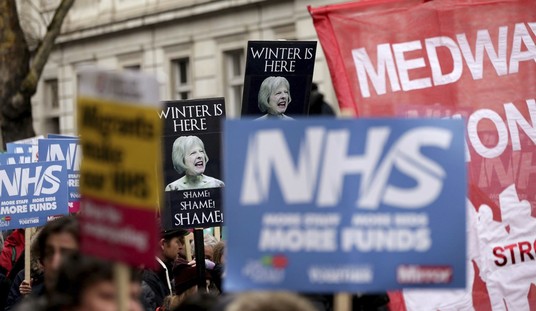Another withering critique of last night’s fizzle, but unlike the rest of the punditocracy, it’s not the delivery he’s objecting to. There’s a serious question raised here that’ll soon be obscured by the mountain of sneering comments about RINOs below: How does the GOP adapt to a political climate in which government, at least momentarily, is seen less as the problem than as the solution? This is what I was getting at in writing about how the public wants to see action for action’s sake, even if they’re skeptical that it’ll work. Lowry’s on target about how Obama’s adapting — by trying to redefine the Great Society agenda as mere centrist “pragmatism” to make it palatable to Americans who dislike big government in theory but not so much in practice. Republicans can either stick to laissez faire and wait for the inevitable liberal overreach to push the country back to the right or, per Brooks (and Bill Kristol) they can start incorporating government solutions into their own platform. The danger of taking the first approach isn’t that we might have to wait a few years, it’s that if Obama succeeds in redefining the center, we might have to wait decades. In that sense, it’s like the amnesty debate: The politically useful thing to do is to pander to Hispanics by supporting it, the principled thing to do is to oppose it and enforce the law. Which course is correct if the latter means you’re out of power for ages and amnesty gets pushed through anyway?
Part of the problem is that the GOP’s done an abysmal job of marketing its alternatives to the stimulus. Dave Weigel compared it yesterday to McCain’s campaign strategy, aimed at winning the news cycle with stunts and memorable soundbites but badly losing the big-picture debate. It often does feel like they have no plan of their own — nihilism, as Brooks puts it — and there’s a reason for that:
During the stimulus debate, the strategist argued, Republicans had an actual alternative but were unable to direct much attention to it — in part because they were focusing so much of their rhetoric on the massive and unnecessary spending in the bill. The debate became a question of an up-or-down decision on the Obama/Democratic plan — not a choice between the Obama/Democratic plan and a Republican plan. “The coverage of the stimulus bill focused on the difference between the House and Senate versions,” the strategist told me, “which were basically two sides of the same coin.” The Republican role was limited to a) saying no to the Obama/Democratic bill, and b) having three moderates in the Senate approve of the bill as long as it offered a little less than what Democrats proposed. The idea that Republicans, mostly in the House, had an actual full-scale alternative, was lost. “On the Sunday talk shows, right after it passed, find me one person who mentioned the Republican alternative,” the strategist said.
So now Republicans want to try something new. They point to last year’s debate over energy, in which the GOP got the upper hand on the issue of drilling — so much so that majority Democrats were forced to retreat from their position. That, the strategist says, was the kind of clearly-articulated policy alternative that Republicans will be seeking to put forward today.
Better get cracking. That 61/26 gap leaves The One with an awful lot of daylight to run in.








Join the conversation as a VIP Member